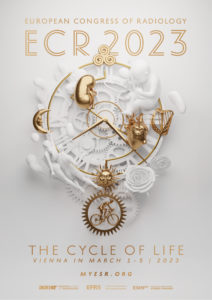
Six dedicated EIBIR sessions will take place during ECR 2023 from March 1-4, 2023. We invite you to learn about and discuss our running and new research projects and explore further the current advancements and funding opportunities of the following topics: AI for health imaging; advances in cancer management, improving quality and safety in imaging and therapy; medical applications of ionising radiation; AI applications in radiation protection and many more!
Visit the EIBIR booth on level -2 to talk to us about funding opportunities for imaging research. We look forward to seeing you at ECR!
All project-related sessions will also be streamed online for free (*).
Paving the way for a European infrastructure for AI for health imaging*
March 1, 13:00-14:30 CET, Room D (level -2)
– Chairpersons’ introduction (Luis Martí-Bonmatí; Valencia/ES, Gabriel P. Krestin; Rotterdam/NL)
– EuCanImage project: towards a European cancer imaging platform for enhanced artificial intelligence in oncology (Martijn Starmans; Rotterdam/NL1)
– CHAIMELEON project (Ignacio Blanquer; Valencia/ES)
– Incisive project (Gianna Tsakou; Marousi/GR)
– PROCANCER-I project: AI modelling strategies with multi-centric data (Nikolaos Papanikolaou; Lisbon/PT)
– PRIMAGE project (Angel Alberich-Bayarri; Valencia/ES)
– EUCAIM project (Luis Martí-Bonmatí; Valencia/ES)
– Discussion
European efforts to improve quality and safety in imaging and therapy*
March 2, 10:30-11:30 CET, Room D (level -2)
– Chairperson’s introduction (Gabriel P. Krestin; Rotterdam/NL)
– i-Violin project (Christoph Hoeschen; Magdeburg/DE)
– SIMPLERAD project: study on the implementation of the Euratom and the EU legal bases with respect to the therapeutic uses of radiopharmaceuticals (Bernd Krause; Rostock/DE)
– AlternativesToGd project (Rachel Katz-Brull; Jerusalem/IL)
– EIBIR activities and upcoming opportunities (Katharina Krischak; Vienna/AT)
– Discussion
March 3, 10:30-12:00 CET, Room D (level -2)
– Chairperson’s introduction (Guy Frija; Paris/FR)
– Medical radiation application research needs and radiation protection (Katrine Riklund; Umea/SE)
– Links between centres of excellence and research infrastructures for the field of medical applications of ionising radiation research (Jean-Michel Dolo; Gif sur Yvette/FR)
– Generating a framework for improved transfer of knowledge to industry and clinical routine (Riccardo Corridori; Brussels/BE)
– A consensus-based European Strategic Research Agenda for medical applications of ionising radiation (Christoph Hoeschen; Magdeburg/DE)
– Discussion
Advances in cancer diagnosis and treatment: EIBIR projects*
March 4, 08:00-09:00 CET, Room D (level -2)
– Chairperson’s introduction (Regina G.H. Beets-Tan; Amsterdam/NL)
– Optical imaging for neuronavigation in brain tumour surgery: the HyperProbe project (Francesco Pavone; Florence/IT)
– Holistic and trustworthy AI evaluation in breast cancer imaging: the RadioVal project (Karim Lekadir; Barcelona/ES)
– A European swarm learning network for training of AI algorithms for breast cancer detection in MRI: The ODELIA project (Daniel Truhn; Aachen/DE)
– European funding opportunities for oncology (Peter Gordebeke; Vienna/AT)
– Discussion
AI applications in radiation protection: the experience of the SINFONIA project*
March 5, 09:30-11:00 CET, Room D (level -2)
– Chairpersons’ introduction (John Damilakis; Iraklion/GR)
– Machine learning in CT dose estimation (John Damilakis; Iraklion/GR)
– Person and object tracking for real-time dosimetry of nuclear medicine personnel (Daniel Santiago Rondon; Mol/BE)
– AI-assisted learning in medical radiation protection (Jurgen Jacobs; Leuven/BE)
– Panel discussion: How can AI support radiation protection in clinical practice?
Funding the future of imaging: the ESR research seed grant
March 4, 08:00-09:00 CET, Foyer C
– Chairpersons’ introduction (Marion Smits; Rotterdam/NL,Gabriel P. Krestin; Rotterdam/NL)
– The brain age biomarker initiative in stroke (Martini Bretzner; Lille/FR)
– PI-QUAL and artificial intelligence: a pilot study to test a novel tool to assess the quality of multiparametric MRI of the prostate (Francesco Giganti; London/UK)
– Diffusion probabilistic models to reduce the use of contrast agent in breast MRI (Teresa Nolte; Aarchen/DE)
– Fetal MRI radiomics for machine learning-assisted lung maturation assessment and outcome prediction (Florian Prayer; Vienna/AT)
– Artificial intelligence for fracture detection in paediatric osteogenesis imperfecta (Susan Shelmerdine; London/UK)
– A convolutional neural network for automated segmentation of solid renal tumours on CT images (Johannes Uhlig; Göttingen/DE)
– Feasibility and pathophysiologic implications of endovascular portal vein arterialisation in a porcine model (Rene Michael Mathy; Heidelberg/DE)
– ICE STUDY – to detect cryoimmunologic response induced by ultrasound-guided cryoablation on early breast cancer: evaluation of specific local and circulating markers (Francesca Galati; Rome/IT)
– Safety and oncologic outcome of percutaneous cryo-ablation compared to partial nephrectomy for T1b RCC: a propensity score matching analysis (Elisabeth G. Klompenhouwer; Amsterdam/NL)
– Application of perinterventional computed tomographic perfusion imaging before and after intraarterial application of vasoactive substances during treatment of primary and secondary liver cancer with radioembolisation and chemoembolization (Christine March; Magdeburg/DE)
– Open forum discussion
How to register for open access sessions at the ECR
In order to access the open access sessions please follow the instructions below:
- Visit the session page on ESR Connect and select the session you would like to attend.
- Click on ‘Login’ in the upper right corner and enter your ESR MyUserArea credentials or create a new ESR account for free (after you have created your account please visit the session page once again).
- The session is now saved in your user menu under ‘My Courses’ which can be accessed via your user icon in the upper right corner.
- When the session starts, log-into your account and visit the session page, where the livestream will start automatically.
